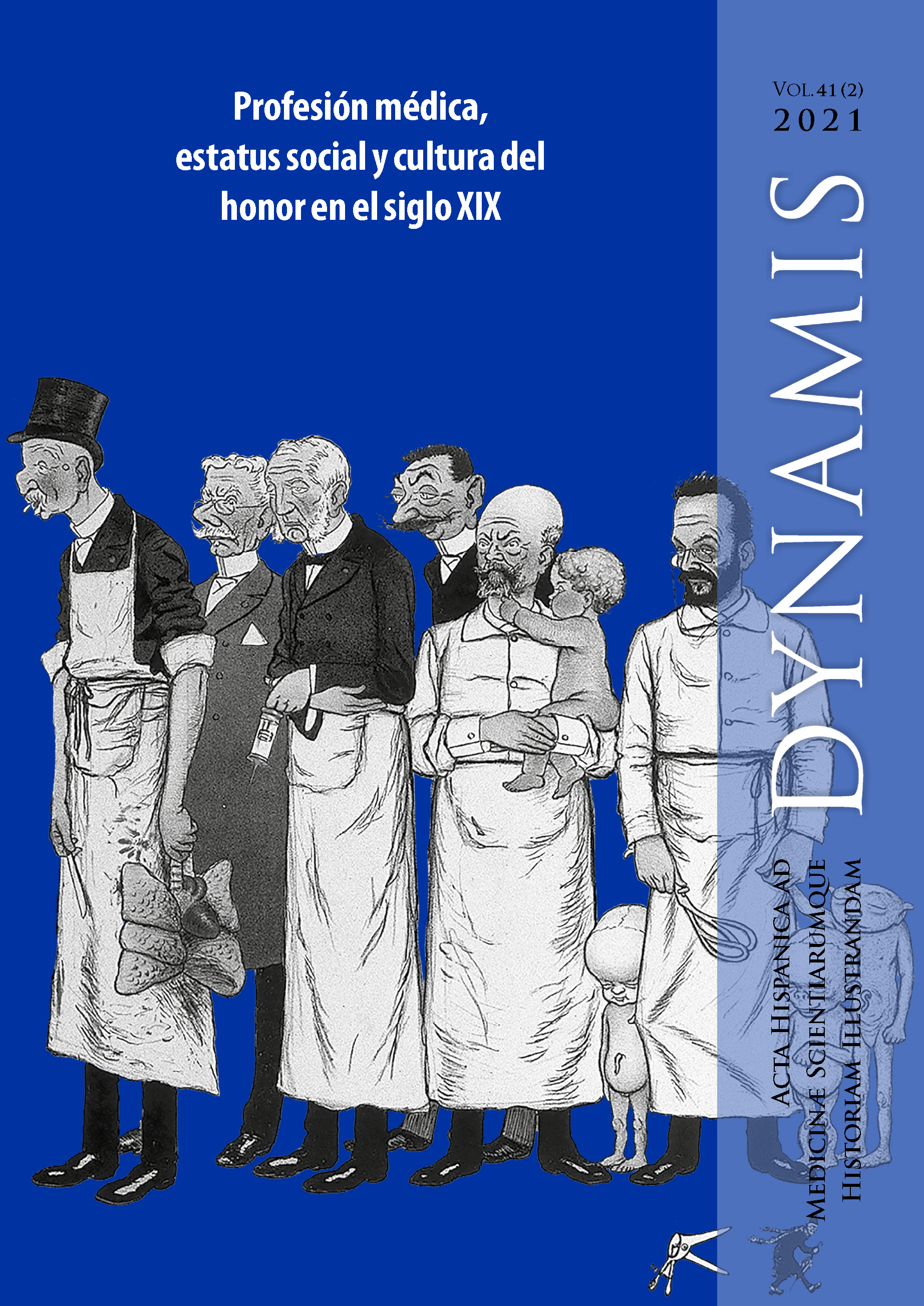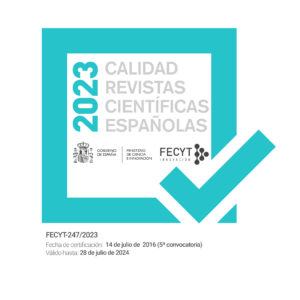Introduction of the modern physician and the debate on medical professionalism in the 19thCentury Ottoman Empire
DOI:
https://doi.org/10.30827/dynamis.v41i2.24539Keywords:
medical fraud, charlatans, medical professionalization, Late Ottoman Empire, Ottoman medicineAbstract
This article focuses on how boundaries were created between modern physicians and traditional healers when the modern medical profession was established in the 19th century Ottoman Empire, based on documents from the Ottoman Archives of the Prime Minister’s Office. In the Tanzimat period (1839-1876), the Ottoman elites focused on modifying the education system with the aim of modernizing the institutions of the Empire, and medical education was one of their priorities. The Imperial School of Medicine was inaugurated in 1839, and a series of regulations simultaneously established that only graduates from the modern schools had the right to practice medicine. These regulations detailed the content of the education, the stages to be completed in order to graduate, and the regulation of professional praxis postgraduation. These regulations drew a boundary between the professional and the layman. Their aim was to achieve the domination of certified professionals over the health field, expelling non-professionals once enough staff became available. The article examines the rivalry between modern and traditional physicians and the diverse strategies employed to distinguish between modern and lay practitioners and to deny legitimacy for some medical practices. The panorama was further complicated by the ethnicity factor in the context of unrest in the Empire at that time. Other questions addressed in this text include: What discourses and legal regulations played a role in forming the boundaries between customary and modern educational processes? How did the Ottoman elites seek to control the population through medicine and health policies?
Downloads
References
İlikan Rasimoğlu, Ceren Gülser. The Foundation of a professional group. Physicians in the nineteenth-century modernizing Ottoman Empire (1839-1908) [doctoral thesis]. Boğaziçi University, the Ataturk Institute for Modern Turkish History, 2012
Witz, Anne. Professions and patriarchy. Routledge; 2013. Yıldırım, Nuran. Türkiye’nin ilk kadın
doktoru Safiye Ali. Tarih Vakfı Yurt Yayınları; 2012.
Balsoy, Gülhan. The politics of reproduction in Ottoman society, 1838-1900. Routledge; 2015.
Malatesta, Maria. Professional men, professional women: The European professions from the 19th century until today. Sage; 2010.
Martykánová, Darina. Reconstructing Ottoman engineers. Archaeology of a profession (1789-
. Plus Pisa University Press; 2010: xvı.
Weisz, George. Divide and Conquer: A comparative history of medical specialisation. New York:
Oxford University Press; 2006
Labisch, Alfons. Doctors, Workers and the scientific cosmology of the industrial world. The social construction of «health» and the «homo hygienicus». Journal of Contemporary History. 1985; 20 (4): 599-615. pp. 603-637.
Labisch, n. 5. Shortt, Samuel Edward Dole. Medical professionalization: pitfalls and promise in
the historiography. HSTC Bulletin. 1981; 5 (3): 210-219, 211.
Goubert, Jean-Pierre. L’art de guérir. Médecine savante et médecine populaire dans la France de 1790. Annales; 1977; 32 (5): 908-926, 910
Weisz, George. The emergence of medical specialization in the Nineteenth Century. Bulletin
of the History of Medicine. 2003; 77 (3): 536-575, 538-541.
Bonner, Thomas Neville. Becoming a physician. Medical education in Britain, France, Germany and the United States, 1750-1945. New York: Oxford University Press; 1995, p. 281.
Ramsey, Matthew. Professional and popular medicine in France, 1770-1830. The social world of
medical practice. Cambridge: Cambridge University Press; 2002, p. 3-4.
Collins, Randall. The credential society: An historical sociology of education and stratification.
Columbia University Press; 2019, p. 177.
Edelman, Nicole. Médecins et charlatans au XIXe siècle en France. Les Tribunes de la Santé. 2017; 55 (2): 21-27, 21-22.
Gelfand, Toby. Medical professionals and charlatans. The comité de salubrité enquête of 1790-91. Histoire Sociale/Social History. 1978; 11 (21): 62-97, 63.
Unterkircher, Alois; Ritzmann, Iris. Unlicensed practice: a lay healer in rural Switzerland. In: Dinges, Martin; Jankrift, Kay Peter; Schlegelmilch, Sabine; Stolberg, Michael, eds. Medical practice, 1600-1900: Physicians and their patients. Leiden: Rodopi; 2015, pp. 230-252, p. 232-233.
Shortt, Samuel Edward Dole. Physicians, science, and status. Issues in the professionalization of
Anglo-American medicine in the nineteenth century. Medical History. 1983; 27 (1): 51-68, 52.
Bourmaud, Philippe. «Ya Doktor»: Devenir médecin et exercer son art en «Terre sainte», une
expérience du pluralisme médical dans l’Empire ottoman finissant (1871-1918) [doctoral thesis].
Université Aix Marseille 1; 2007, p. 12.
Özbek, Nadir. Tarihyazıcılığında Güvenlik Kurum ve Pratiklerine ilişkin bir değerlendirme. In: Özbek,Nadir; Levy, Noemi, eds. Jandarma ve polis: Fransa ve Osmanlı tarihçiliğinde çapraz bakışlar. İstanbul: Tarih Vakfı Yurt Yayınları; 2009, p. 7.
Deringil, Selim. The well-protected domains: Ideology and the legitimation of power in the
Ottoman Empire 1876-1909. London and New York: I.B. Tauris; 1999.
Anastassiadou Dumont, Méropi. Science et engagement. La modérnité ottomane à l’age des nationalismes. In: Anastassiadou Dumont, Méropi, eds. Médecins et ingénieurs Ottomans à l’âge des nationalismes. Maisonneuve et Larose Institut Français d›Etudes Anatoliennes; 2003, p. 5-28.
Fahmy, Khaled. In quest of justice: Islamic law and forensic medicine in modern Egypt. Univ of
California Press; 2018, p. 15-16
Shefer-Mossensohn, Miri. Ottoman medicine. Healing and medical institutions, 1500-1700. SUNY Press; 2009, p. 21-25.
Küçük, Harun. Science without leisure: Practical naturalism in Istanbul, 1660-1732. University of
Pittsburgh Press; 2019, p. 50-51
Kırlı, Cengiz. Surveillance and constituting the public in the Ottoman Empire. In: Shami, Seteney,
ed. Publics, politics and participation: Locating the public sphere in the Middle East and North
Africa. New York: Social Science Research Council; 2008, pp. 283-306, p. 286.
Kırlı, Cengiz. Balkan nationalisms and the Ottoman Empire: Views from Istanbul streets. Paper
presented at the Ottoman Rule and the Balkans, 1760-1850: Conflict, Transformation, Adaptation, Rethymno, Greece; 2003, p. 250.
Guillem-Llobat, Ximo. The boundaries of fraud: the role of the Spanish Real Academia de Medicina in the establishment of food safety and quality standards in the late-nineteenth century. Dynamis. 2017; 37 (2): 413-434.
Cowen, David L. Liberty, laissez-faire and licensure in nineteenth century Britain. Bulletin of the
History of Medicine. 1969; 43 (1): 30-40, 32.
Yıldırım, Nuran. A History of healthcare in İstanbul. İstanbul: The İstanbul 2010 European Capital
of Culture Agency and İstanbul University Project. No: 55-10, Translated by Özekmekçi, M. İnanç;
, p. 281.
Yalçınkaya, M. Alper. Muslims’ contribution to science and Ottoman identity. In: Al-Tikriti, Nabil;
Aydogan, Zeynep; Campos, Michelle U. et al., eds. Living in the Ottoman realm: Empire and
identity, 13th to 20th centuries. Indiana University Press; 2016, pp. 272-283, 276.
İlikan Rasimoğlu, Ceren Gülser. «The foundation of a professional
group: Physicians in the Nineteenth Century modernizing Ottoman Empire (1839-1908)».
Boğaziçi University (2012).
Freidson, Eliot. Professionalism, the third logic. On the practice of knowledge. University of
Chicago press; 2001, p. 204.
Özçelikay, Gülbin; Asil, Eriş. Osmanlı İmparatorluğu›nda klasik ve modern eczacılık eğitimi ve
öğretimi. In: Nuhoğlu, Hidayet Yavuz ed. Osmanlı dünyasında bilim ve eğitim milletlerarası
kongresi tebliğleri İstanbul 12-15 Nisan 1999. İstanbul: İslam Tarih, Sanat ve Kültür Araştırma
Merkezi; 2001.
Ersoy, Nermin. Başbakanlık Osmanlı arşiv belgelerine dayanarak; 18. ve 19. yüzyılda kırık-çıkıkçılar. In: II. Türk tıp tarihi kongresi İstanbul: 20-21 Eylül 1990. Ankara: Türk Tarih Kurumu Yayınları; 1999, p. 149.
Kaysılı, Barış. Tanzimat’tan Cumhuriyet’e Türkiye’de sağlık eğitimi üzerine bir araştırma (1839-1938). [M.A. thesis]. Selçuk University; 2006, p. 54.
Yıldırım, Nuran. Berberlerden diş hekimlerine İstanbul’da «dişçiler mektebi» kurma çabaları ve
dişçi mektebinin açılışı. Toplumsal Tarih. 2006; 146: 38-43, 38.
Tahsin, Rıza. Tıp fakültesi tarihçesi (Mirat-ı mekteb-i tıbbiye) cilt 1-2. Kazancıgil, Aykut ed. Özel Yayınlar; 1991, p. 27.
Ergin, Osman Nuri. Mecelle-i umûr-ı belediyye vol 6. İstanbul: İstanbul Büyükşehir Belediyesi,
; p. 3056-3061
Nye, R. A. Honor codes and medical ethics in modern France. Bulletin of the History of Medicine.
; 69 (1): 91-111, 93-94.
Baschin, Marion, Dietrich-Daum, Elisabeth and Ritzmann, Iris. Doctors and their patients in the seventeenth to nineteenth centuries. In: Dinges, Martin; Jankrift, Kay Peter; Schlegelmilch,
Sabine; Stolberg, Michael, eds. Medical practice, 1600-1900: Physicians and their patients. Brill;
, p. 62.
Schilling, Ruth, Jankrift, Kay Peter. Medical practice in context: Religion, family, politics and scientific networks. In: Dinges, Martin; Jankrift, Kay Peter; Schlegelmilch, Sabine; Stolberg, Michael, eds. Medical practice, 1600-1900: Physicians and their patients. Brill; 2016, pp. 131-148, p. 132.
Romano, Terrie M. Professional identity and the nineteenth-century Ontario medical profession.
Histoire Sociale/Social History. 1995; 28 (55): 77-98, 78.
Günergun, Feza; Yıldırım, Nuran. Cemiyet-i Tıbbiye-i Şahane’nin Mekteb-i Tıbbiye-i Şahane’ye
getirdiği eleştiriler (1857-1867). Osmanlı Bilimi Araştırmaları. 2001; 3(1): 19-63, 19.
Martykánová, Darina. Ottoman engineers: the redefinition of expert identities during the reign of Abdülhamid II and the early years of the second constitutional period. Turcica. 2014; 45:
-156, 133.
Yılmaz, Seçil. Love in the time of syphilis. Medicine and sex in the Ottoman Empire, 1860-1922. [doctoral thesis]. City University of New York, 2016: 40-42
Gouzévitch, Irina; Cardoso de Matos, Ana; Martykánová, Darina. «La Russie, l’Espagne, le Portugal et l’Empire ottoman. Deux siècles de politiques technoscientifiques à l’épreuve des approches comparatistes. In: Kleiche-Dray, Mina, eds. Les ancrages nationaux de la science mondiale XVIIIeXXIe siècles, Paris, Éditions des archives contemporaines. IRD Éditions; 2017, p. 239-286, 246.
Yalçınkaya, Mehmet Alper. «Their science, our values»: Science, state and society in the 19th
century Ottoman Empire. University of California, San Diego; 2010, p. 48-49
Yıldırım, Nuran. Nurican Efendi’nin yeni bulunan deontoloji kitabı I. Tarih ve Toplum. 1993; 116:
-21; 17-18.
Yıldırım, Nuran. Nurican Efendi’nin yeni bulunan deontoloji kitabı II. Tarih ve Toplum. 1993; 117:
-38; 33-34.
Yıldırım, Nuran. Nurican Efendi’nin yeni bulunan deontoloji kitabı III. Tarih ve Toplum. 1993;
: 52-56, 56
Yıldırım, Nuran. Türk hekimlerinin seçkinleşme sürecinde tıp bilgisinin transferi. In: Erdemir,
Ayşegül Demirhan, et al. eds. Uluslararası Türk Tıp Tarihi Kongresi, 10. Ulusal Türk Tıp Tarihi
Kongresi Bildiri Kitabı. C. I. 20-24 Mayıs 2008. İstanbul; 2008, p. 101-124
Tunaya, Tarık Zafer. Türkiye’de siyasal partiler cilt I. İkinci meşrutiyet dönemi. İstanbul: Hürriyet
Vakfı Yayınları; 1984, p. 566.
Downloads
Published
How to Cite
Issue
Section
License
Dynamis se encuentra adherida a una licencia Creative Commons Reconocimiento (by), la cual permite cualquier explotación de la obra, incluyendo una finalidad comercial, así como la creación de obras derivadas, la distribución de las cuales también está permitida sin ninguna restricción.

















